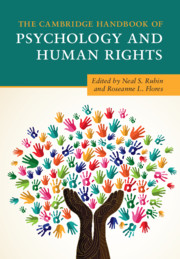Book contents
- The Cambridge Handbook of Psychology and Human Rights
- The Cambridge Handbook of Psychology and Human Rights
- Copyright page
- Dedication
- Contents
- Figures
- Tables
- Boxes
- Contributors
- Acknowledgments
- The Core International Human Rights Instruments and Their Monitoring Bodies
- Universal Human Rights Instruments
- Sustainable Development Goals
- Glossary of United Nations and Psychology Acronyms in the Handbook
- Introduction
- Part I History of Human Rights
- Part II The Intersection of Psychology and Human Rights
- Part III Contemporary Issues in Psychology and Human Rights
- Part IV Teaching, Research, and Training in Psychology and Human Rights
- 31 Decolonization and Liberation Psychology
- 32 Education of Psychologists for Human Rights Awareness, Accountability, and Action
- 33 Conducting Psychological Research across Borders
- 34 Diversity in Psychology Education and Training
- 35 Preparing Future Generations
- Part V Future Directions
- Index
- References
31 - Decolonization and Liberation Psychology
The Case of Psychology in South Africa
from Part IV - Teaching, Research, and Training in Psychology and Human Rights
Published online by Cambridge University Press: 02 October 2020
- The Cambridge Handbook of Psychology and Human Rights
- The Cambridge Handbook of Psychology and Human Rights
- Copyright page
- Dedication
- Contents
- Figures
- Tables
- Boxes
- Contributors
- Acknowledgments
- The Core International Human Rights Instruments and Their Monitoring Bodies
- Universal Human Rights Instruments
- Sustainable Development Goals
- Glossary of United Nations and Psychology Acronyms in the Handbook
- Introduction
- Part I History of Human Rights
- Part II The Intersection of Psychology and Human Rights
- Part III Contemporary Issues in Psychology and Human Rights
- Part IV Teaching, Research, and Training in Psychology and Human Rights
- 31 Decolonization and Liberation Psychology
- 32 Education of Psychologists for Human Rights Awareness, Accountability, and Action
- 33 Conducting Psychological Research across Borders
- 34 Diversity in Psychology Education and Training
- 35 Preparing Future Generations
- Part V Future Directions
- Index
- References
Summary
This chapter focuses on psychology in South Africa as a discipline and profession embedded in a history of colonialism and apartheid. It a describes South African psychology as a site of epistemological contestation shaped by historical racial identities and relations of power and asserts that liberation psychology is central to the contribution of the profession to eliminating human rights violations and fostering well-being. National student protests in 2015–2016 called for the “decolonization” of the curriculum, bringing into sharp focus the decades-long debate about the relevance of psychology and the need for transformation. While the focus is psychology in South Africa, the chapter broadens the discussion of decolonizing the field to other nations plagued by histories of racial oppression such as Australia and the United States. Changes in the decolonizing process are not without their challenges, yet in a field of study that is one of the most popular among students, a cogent move toward decolonizing the psychology curriculum entails the invention of new voices and theories as well as liberation psychology practices that center squarely on the needs for equity, violence prevention, and social justice.
- Type
- Chapter
- Information
- The Cambridge Handbook of Psychology and Human Rights , pp. 461 - 474Publisher: Cambridge University PressPrint publication year: 2020



